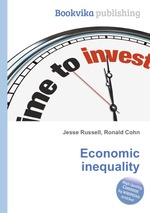Economic inequality
Jesse Russell Ronald Cohn
бумажная книга
High Quality Content by WIKIPEDIA articles! Economic inequality (or "wealth and income differences") comprises all disparities in the distribution of economic assets and income. The term typically refers to inequality among individuals and groups within a society, but can also refer to inequality among countries. The issue of economic inequality is related to the ideas of equity: equality of outcome and equality of opportunity. The main instrument which diminishes economic inequality, progressive taxation, has been demonstrated to be effective in international comparisons of income compression and wealth distribution. It is a contested issue whether economic inequality is a negative phenomenon, both on utilitarian and moral grounds. A book published in 2009 claims that negative social phenomena such as shorter life expectancy, higher disease rates, homicide, infant mortality, obesity, teenage pregnancies, emotional depression and prison population correlate with higher socioeconomic inequality. It has been argued that a growing concentration of wealth precedes economic boom-bust cycles which are associated with rising unemployment and falling incomes, and hence a loss of social welfare. It has also been argued that growing wealth disparity creates poverty.


